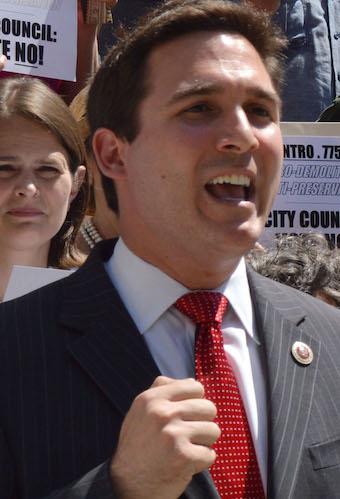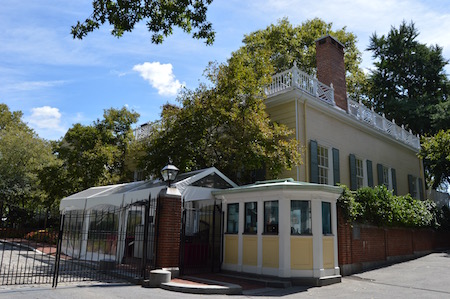
BY JACKSON CHEN | Instead of city offices going dark at 5 p.m., theater companies may be able to keep them lit up — with their footlights — under a new City Council proposal that would allow such organizations to rent the space for rehearsals and performances. The bill’s author, Councilmember Ben Kallos, is hoping to allow artists who are starved for workspace to take advantage of the underutilized city-owned properties during after-hours.
According to Kallos’ “City Spaces” legislation, introduced on August 22, the Department of Citywide Administrative Services would identify which city-owned and operated property are able to be rented and the costs associated with that. The agency would also manage the schedule of renters and create a website where the public could book the spaces, according to the bill.
“Unfortunately, the difficulties of being an artist are more than just a trope,” Kallos said. “The challenges of space to develop, practice, and perform becomes ever more difficult as real estate becomes scarce, prices continue to skyrocket, and the rest of us get squeezed out.”
The Upper East Side councilmember is no stranger to the struggles artists face. In 2010, he worked with the political comedy group Laughing Liberally to produce a stand-up comedy event whose title, “The Pirates of the Bronx: The Curse of Pedro Espada,” poked fun at an indicted state senator who would go on to be convicted on federal corruption charges. One of the challenges in producing that show, Kallos recalled, was the lack of affordable rehearsal space in the city.
For the founders of Elephant Run District, a local independent theater company, that same scarcity six years later has led to an Upper West Side apartment serving triple duty as home, office, and oftentimes rehearsal space — at least for sessions that don’t require a full complement of stage equipment.
“We do anything to offset the costs of rehearsal space where and when we can because it is such a big item on everybody’s budget,” Chris Harcum, the company’s co-founder and executive director said. “When the biggest item in your budget is real estate, it just feels like things are out of whack, when the biggest thing in your budget should be paying artists.”
Guy Yedwab, managing director of the League of Independent Theater, an advocacy group created to ensure the industry’s sustainability, said that an analysis by the New York Innovative Theater Foundation found that on average independent theater companies pay between 40 and 60 percent of their show budget for performance and rehearsal space.
When Elephant Run District needs an actual performance space to work with, Harcum said, they look to spacefinder.org, a search tool developed by the arts nonprofit Fractured Atlas.
Spacefinder.org currently lists four Manhattan city-owned properties in close proximity downtown that are available for public rental — New York Surrogate’s Court at 31 Chambers Street, New York County Supreme Court at 60 Centre Street, the Tweed Courthouse at 52 Chambers Street, and the Louis J. Lefkowitz State Office Building at 141 Worth Street — as well as two courthouses in Queens, Brooklyn Borough Hall, and the Bronx County Courthouse. According to Kallos, these eight locations were originally posted on Spacefinder.org in 2014 in the hopes they would pave the way for more city-owned spaces opening up.
“There are so many municipal city spaces — lots, garages, halls, hearing rooms, auditoriums, you name it,” Kallos said. “So much of that space isn’t being used.”
The councilmember hopes that in the future the city’s embrace of the arts will lead to everything from public schools to New York City Housing Authority properties becoming available for rental.

One choice piece of property on East End Avenue at 88th Street on the Upper East Side is the official residence of Mayor Bill de Blasio.
“In the event that Gracie Mansion wasn’t being used by the mayor, that would be a prime location in the district for performances,” Kallos said.
His bill has already won support from theater organizations, like the League of Independent Theater and IndieSpace, which works to create long-term, permanent space for independent theater.
According to the league’s Yedwab, roughly 60 theater spaces have closed down in the last decade or so because of the competitive real estate market in the city.
“When you have a theater, it’s not the most profitable use of the space,” he said. “A lot of times many of them were converted into private luxury housing.”
Many theater companies that have been pushed out of their former homes have resorted to using conference rooms of businesses or someone’s studio apartment for rehearsal space, Yedwab said.
As IndieSpace works on the issue of permanent homes for theater organizations, its executive director, Randi Berry, is pleased that Kallos’ bill is bringing the immediate needs of these arts organizations to the Council’s attention.
“I think the city has started thinking about at least temporary rehearsal space because of initiatives like Ben’s,” Berry said. “It doesn’t make sense that all of these buildings are closing at 5 o’clock and nobody is using them.”
If the City Spaces legislation is successful, Berry is hoping that the city will become more amenable to working with IndieSpace and other groups on the challenge of creating permanent spaces for artists, a mission that would bring a host of benefits for the industry overall.
With a permanent and reliable venue, Elephant Run District’s Harcum said, artists can feel more comfortable and develop a greater sense of cohesion as they work on perfecting their performances for opening night.
“I know very few, if any, indie theater companies that are working consistently out of a single space,” Harcum said. “Having consistent space… it’s just so rare.”
But, whether it’s long-term space or just a rental that a company gets in the end, he is hopeful Kallos’ legislation can be a first step in producing a healthy supply of space that artists can rely on.
“It’s like the difference between feeding people and not feeding people, like City Harvest,” Harcum said, referring to the nonprofit that collects excess food and then donates it. “The food can go to waste or the food can go to benefit people. To my way of thinking, if there’s empty space, that’s kind of a crime.”






































